Startups developing an API for sleep inertia, a platform to assess knee, mastering financial life, improving postoperative results, and fiber-optic modulators each win CHF 10,000
25.01.2021
Galventa, Inmodi, Kaspar&, Spirecut and Versics win Venture Kick's first stage of financial and entrepreneurial support. Their projects treat sleep inertia to adjust sleep-wake cycle, collect relevant information about the integrity of knees and evaluate certain musculoskeletal disorders or injuries, fill the missing possibility to easily build up wealth due to negative interest rates, allow percutaneous release under sonography and the patient to immediately go back to work, and foster the next generation of high-speed, electro-optic hardware for communications.
5.jpg) |
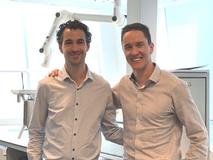 Galventa's founders: left to right, Dario Dornbierer and Sascha Fritsche
|
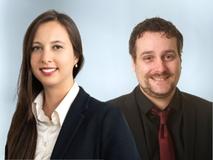 Inmodi: Olga Motovilova and Dr. Jérôme Thevenot
|
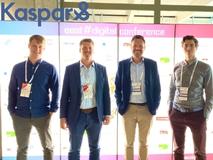 Kaspar&: from left to right: Lauro Böni (process and systems management), Sebastian Büchler (technology and infrastructure), Dr. Jan-Philip Schade (project management and business development), Dr. Lukas Plachel (investment strategies and processes)
|
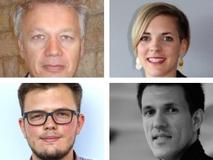 Spirecut: Founder Frédéric Schuind, Business Developer Charlotte Raemy, Quality Manager Edmond Sula, and Software Engineer Loïc Voillat
|
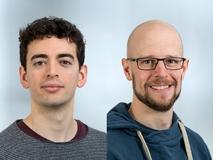 Versics: Marc Reig Escalé and Fabiann Kaufman
|
Galventa: reseting one's chronobiological clock
A large percentage of the population has difficulties getting up or staying awake due to sleep inertia. Sleep inertia is a state of impaired cognitive performance where an individual has a strong desire to continue sleeping after awakening (lasting for 15 minutes to several hours). The symptoms are severely present in non-medical populations, such as shift-workers, jet-lagged- or sleep deprived people and in medical conditions associated with delayed sleep phase syndrome or major depression disorder among others. Galventa's founders Dario Dornbierer, and Sascha Fritsche, developed a patentable innovation based on micro-pellets that allows to establish time-controlled releases systems containing an active substance. Their first nutraceutical product (The Swiss Caffeine Clock) is for those who seek to control their sleep-wake cycle and wake up with ease. It is the only scientifically proven food supplement that empowers you to control your wake-up process. Unlike stimulants, other sleep-aids, or your alarm clock, The Swiss Caffeine Clock doesn't disturb your sleep but aligns your sleep-wake cycle to your lifestyle (based on patented, cutting edge pharmaceutical technology). The Venture Kick funds will be used to conduct market tests and in order to develop their branding strategy. galventa.com
Inmodi: a smart wearable to assess knee health at any Point of Care
One of the leading causes of chronic knee pain and disability worldwide is osteoarthritis (OA), an irreversible degradation of cartilage, affecting millions of people worldwide. The disease remains to date incurable and is typically detected at a late stage. Rise in obesity, sedentary lifestyle and ageing population contribute to an increase in OA prevalence and in knee replacement surgeries (a costly late stage OA treatment). The progression of the disease can be delayed or prevented if patients get early on preventative regimens and adhere to these. To activate patients for these regimens, accessible and cost effective detection as well as objective tracking of joint health progression is required. Inmodi is developing a ML-enabled smart wearable, which analyses acoustic, thermal and kinematic data extracted from the knee in motion. This data is needed to assess the knee function and integrity and help earlier detect conditions such as OA. The smart wearable is user friendly, provides quantifiable results – which are easy to track – and can be used at any Point of Care. The technology was invented by Dr. Jérôme Thevenot, a Biomechanical researcher. He is further supported by Olga Motovilova and by experienced board members and advisors, helping bring the new joint assessment approach to market. The mission is to prevent disability and decrease socioeconomic burden caused by musculoskeletal disorders, by easily checking and monitoring joint health anywhere. The team sees further applications for the technology in rehabilitation, diagnostics, sports and research.
The Venture Kick funds will help further develop the prototype and acquire early adopters and key partners. inmodi.com
Kaspar&: mastering financial life
Taking care of one's financial life can be a burden. Kaspar& is designed to provide seamless and comfortable access to professional financial services bringing a new level of financial wellness to their customers. For this reason, Kaspar&'s first mission is to solve one of the largest financial problems of our time: the missing possibility to easily build up wealth due to negative interest rates. Kaspar&’s team are Lauro Böni, responsible for process and systems management, technology lead Sebastian Büchler, Dr. Lukas Plachel, responsible for all investment topics and processes and Dr. Jan-Philp Schade, leading the overall project management and business development. Sebastian Büchler is currently undertaking his Ph.D. studies at University of St.Gallen within the field of AI. As investing is the only option to earn interest in today’s world, Kaspar& seeks to offer a radically accessible investment experience. They achieve this by creating a seamless onboarding process, eliminating minimum investments, emotionalizing investing through personal goals and letting customers automatically save and invest the change money from their everyday payment transactions.
Kaspar& is planning to use the Venture Kick financing in two main areas: first for its further prototype development and second for its community building program. kasparund.ch
Spirecut: improving the postoperative results after trigger finger and carpal tunnel release
Carpal tunnel syndrome and trigger finger affect 4-8% of adults. Every year around 25'000 carpal tunnel operations are performed in Switzerland and over 500’000 in USA. Indeed, carpal tunnel syndrome and trigger finger are the most frequent operations performed by hand surgeons. The classical treatment is open (or endoscopic) release, with significant morbidity and several weeks of sick leave. Spirecut's device allows percutaneous release (no surgical incision, no scar) under sonography. The morbidity is minimal and the patient can immediately go back to his/her occupations including work. The team is composed of Founder Frédéric Schuind, MD, PhD; Business Developer Charlotte Raemy; Quality Manager Edmond Sula, and Software Engineer Loïc Voillat. Together they develop patented surgical instruments for percutaneous treatment of carpal tunnel syndrome and trigger finger, allowing a new technique avoiding an operative wound. The operation is done under sonography, and can be performed under local anaesthesia in outpatient offices. Spirecut is currently working on certification and industrialisation of the instruments with a Swiss subcontractor. The aim is later to implement this technique for other surgical indications and locations. The Venture Kick funds will contribute to reach the next milestones before the go to the market by mid-2021: verification of prototypes, ISO 13485 certification, validation, tooling, cleaning, sterilisation and transport validations, CE-marking, and FDA approval. spirecut.com
Versics: enabling the data traffic of the future
The most valuable asset in our modern world is no longer oil, but data. The exchange of data in the human-machine and the machine-?machine channels currently consumes around 9% of the global energy with a yearly growth of 20-?30%. The deployment of faster data networks, 5G, and the Internet of Things (IoT) is rising, and their future energy footprint will significantly contribute to the global climate crisis.
Worldwide data communication traffic is growing at a compound annual growth rate (CAGR) of 46%, achieving a >40-fold increase in the next decade. To simultaneously enhance the network’s bandwidth and sustain the energy levels, network providers need to upgrade critical infrastructure nodes. Versics tackles one of them: the data conversion from electronic bits (inside a computer) to optical pulses (for fiber-optics deployments) using electro-optic modulators. Current commercial solutions have reached performance limits in energy efficiency, speed, and reliability. Achieving higher bandwidth requires deploying parallel systems, resulting in unsustainable energy demands for internet and cloud service providers.
Versics sells electro-optic components for the next generation of high-speed fiber-optics networks, which serve the markets of data centers, long-haul communications, harsh environments, and test & measurement. The technology combines the best properties of two materials: pure electro-optic modulation from traditional lithium niobate devices and highly scalable fabrication runs from silicon photonics. It was invented at ETH Zurich in the early 2000s and is now ready for commercialization. The team is composed of Dr. Marc Reig Escalé (Pioneer Fellow of ETH Zurich and focused on the business development) and Fabian Kaufmann (PhD student in the core technology at ETH Zurich with the main focus on product development). Additionally, the team counts with Prof. Rachel Grange as scientific advisor and Michael Stucky as a business advisor.
The Venture Kick funding will help Versics add 10s of new contacts in their current customer pipeline to fine-tune the market-product fit of their minimum viable product (MVP). In parallel, the team will set up a marketing campaign for their MVP launch in mid-2021, and extend the core team with a profile with deep-tech product management experience. versics.com
A large percentage of the population has difficulties getting up or staying awake due to sleep inertia. Sleep inertia is a state of impaired cognitive performance where an individual has a strong desire to continue sleeping after awakening (lasting for 15 minutes to several hours). The symptoms are severely present in non-medical populations, such as shift-workers, jet-lagged- or sleep deprived people and in medical conditions associated with delayed sleep phase syndrome or major depression disorder among others. Galventa's founders Dario Dornbierer, and Sascha Fritsche, developed a patentable innovation based on micro-pellets that allows to establish time-controlled releases systems containing an active substance. Their first nutraceutical product (The Swiss Caffeine Clock) is for those who seek to control their sleep-wake cycle and wake up with ease. It is the only scientifically proven food supplement that empowers you to control your wake-up process. Unlike stimulants, other sleep-aids, or your alarm clock, The Swiss Caffeine Clock doesn't disturb your sleep but aligns your sleep-wake cycle to your lifestyle (based on patented, cutting edge pharmaceutical technology). The Venture Kick funds will be used to conduct market tests and in order to develop their branding strategy. galventa.com
Inmodi: a smart wearable to assess knee health at any Point of Care
One of the leading causes of chronic knee pain and disability worldwide is osteoarthritis (OA), an irreversible degradation of cartilage, affecting millions of people worldwide. The disease remains to date incurable and is typically detected at a late stage. Rise in obesity, sedentary lifestyle and ageing population contribute to an increase in OA prevalence and in knee replacement surgeries (a costly late stage OA treatment). The progression of the disease can be delayed or prevented if patients get early on preventative regimens and adhere to these. To activate patients for these regimens, accessible and cost effective detection as well as objective tracking of joint health progression is required. Inmodi is developing a ML-enabled smart wearable, which analyses acoustic, thermal and kinematic data extracted from the knee in motion. This data is needed to assess the knee function and integrity and help earlier detect conditions such as OA. The smart wearable is user friendly, provides quantifiable results – which are easy to track – and can be used at any Point of Care. The technology was invented by Dr. Jérôme Thevenot, a Biomechanical researcher. He is further supported by Olga Motovilova and by experienced board members and advisors, helping bring the new joint assessment approach to market. The mission is to prevent disability and decrease socioeconomic burden caused by musculoskeletal disorders, by easily checking and monitoring joint health anywhere. The team sees further applications for the technology in rehabilitation, diagnostics, sports and research.
The Venture Kick funds will help further develop the prototype and acquire early adopters and key partners. inmodi.com
Kaspar&: mastering financial life
Taking care of one's financial life can be a burden. Kaspar& is designed to provide seamless and comfortable access to professional financial services bringing a new level of financial wellness to their customers. For this reason, Kaspar&'s first mission is to solve one of the largest financial problems of our time: the missing possibility to easily build up wealth due to negative interest rates. Kaspar&’s team are Lauro Böni, responsible for process and systems management, technology lead Sebastian Büchler, Dr. Lukas Plachel, responsible for all investment topics and processes and Dr. Jan-Philp Schade, leading the overall project management and business development. Sebastian Büchler is currently undertaking his Ph.D. studies at University of St.Gallen within the field of AI. As investing is the only option to earn interest in today’s world, Kaspar& seeks to offer a radically accessible investment experience. They achieve this by creating a seamless onboarding process, eliminating minimum investments, emotionalizing investing through personal goals and letting customers automatically save and invest the change money from their everyday payment transactions.
Kaspar& is planning to use the Venture Kick financing in two main areas: first for its further prototype development and second for its community building program. kasparund.ch
Spirecut: improving the postoperative results after trigger finger and carpal tunnel release
Carpal tunnel syndrome and trigger finger affect 4-8% of adults. Every year around 25'000 carpal tunnel operations are performed in Switzerland and over 500’000 in USA. Indeed, carpal tunnel syndrome and trigger finger are the most frequent operations performed by hand surgeons. The classical treatment is open (or endoscopic) release, with significant morbidity and several weeks of sick leave. Spirecut's device allows percutaneous release (no surgical incision, no scar) under sonography. The morbidity is minimal and the patient can immediately go back to his/her occupations including work. The team is composed of Founder Frédéric Schuind, MD, PhD; Business Developer Charlotte Raemy; Quality Manager Edmond Sula, and Software Engineer Loïc Voillat. Together they develop patented surgical instruments for percutaneous treatment of carpal tunnel syndrome and trigger finger, allowing a new technique avoiding an operative wound. The operation is done under sonography, and can be performed under local anaesthesia in outpatient offices. Spirecut is currently working on certification and industrialisation of the instruments with a Swiss subcontractor. The aim is later to implement this technique for other surgical indications and locations. The Venture Kick funds will contribute to reach the next milestones before the go to the market by mid-2021: verification of prototypes, ISO 13485 certification, validation, tooling, cleaning, sterilisation and transport validations, CE-marking, and FDA approval. spirecut.com
Versics: enabling the data traffic of the future
The most valuable asset in our modern world is no longer oil, but data. The exchange of data in the human-machine and the machine-?machine channels currently consumes around 9% of the global energy with a yearly growth of 20-?30%. The deployment of faster data networks, 5G, and the Internet of Things (IoT) is rising, and their future energy footprint will significantly contribute to the global climate crisis.
Worldwide data communication traffic is growing at a compound annual growth rate (CAGR) of 46%, achieving a >40-fold increase in the next decade. To simultaneously enhance the network’s bandwidth and sustain the energy levels, network providers need to upgrade critical infrastructure nodes. Versics tackles one of them: the data conversion from electronic bits (inside a computer) to optical pulses (for fiber-optics deployments) using electro-optic modulators. Current commercial solutions have reached performance limits in energy efficiency, speed, and reliability. Achieving higher bandwidth requires deploying parallel systems, resulting in unsustainable energy demands for internet and cloud service providers.
Versics sells electro-optic components for the next generation of high-speed fiber-optics networks, which serve the markets of data centers, long-haul communications, harsh environments, and test & measurement. The technology combines the best properties of two materials: pure electro-optic modulation from traditional lithium niobate devices and highly scalable fabrication runs from silicon photonics. It was invented at ETH Zurich in the early 2000s and is now ready for commercialization. The team is composed of Dr. Marc Reig Escalé (Pioneer Fellow of ETH Zurich and focused on the business development) and Fabian Kaufmann (PhD student in the core technology at ETH Zurich with the main focus on product development). Additionally, the team counts with Prof. Rachel Grange as scientific advisor and Michael Stucky as a business advisor.
The Venture Kick funding will help Versics add 10s of new contacts in their current customer pipeline to fine-tune the market-product fit of their minimum viable product (MVP). In parallel, the team will set up a marketing campaign for their MVP launch in mid-2021, and extend the core team with a profile with deep-tech product management experience. versics.com


